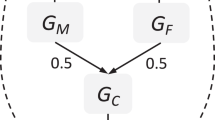Abstract
There is emerging evidence of gene-environment interaction effects on conduct problems, both from adoption studies and from a study using a measured genotype. An association between non-violent family dysfunction and conduct problems has also been reported, although not in the context of gene–environment interaction studies. The aim of this study was to examine the interaction of genes and family dysfunction in contributing to conduct problems in young people. Parents of 278 monozygotic and 378 dizygotic twin pairs, aged 5–18, from the CaStANET birth cohort twin register were questioned about zygosity, conduct problems and family environment. Using structural equation modeling we tested for main and interactive effects of genes and family dysfunction modelled as an environmental “moderator variable”. Both main and gene–environment interaction effects were highly significant. It was concluded that a risk genotype conferring susceptibility to family dysfunction is responsible for most of the variance in antisocial symptoms in childhood and adolescence.
Similar content being viewed by others
Abbreviations
- GE:
-
Gene–environment interaction
- SDQ:
-
Strengths and Difficulties Questionnaire
References
J. Byles C. Byrne M. H. Boyle D. R. Offord (1988) ArticleTitleOntario Child Health Study:reliability and validity of the general functioning subscale of the McMaster Family Assessment Device Fam. Process. 27 97–104 Occurrence Handle3360100 Occurrence Handle1:STN:280:BieC1Mnjt1Y%3D
R. J. Cadoret C. A. Cain (1981) Genetic-Environmental Interaction in Adoption Studies of Antisocial Behaviors in Adoptees G. Perris G. Struwe B. Jansson (Eds) Biological Psychiatry Elsevier Amsterdam 97–100
R. J. Cadoret W. R. Yates E. Troughton G. Woodworth M. A. Stewart (1995) ArticleTitleGenetic-environmental interaction in the genesis of aggressivity and conduct disorders Arch. Gen. Psychiatry. 52 916–924 Occurrence Handle7487340 Occurrence Handle1:STN:280:BymD28npvFA%3D
A. Caspi J. McClay T. E. Moffitt J. Mill J. Martin I. W. Craig A. Taylor R. Poulton (2002) ArticleTitleRole of genotype in the cycle of violence in maltreated children Science 297 851–854 Occurrence Handle12161658 Occurrence Handle2002Sci...297..851C Occurrence Handle1:CAS:528:DC%2BD38XlvV2jsbg%3D
C. R. Cloninger S. Sigvardsson M. Bohman A. L. von Knorring (1982) ArticleTitlePredisposition to petty criminality in Swedish adoptees. II. Cross- fostering analysis of gene-environment interaction Arch. Gen. Psychiatry 39 1242–1247 Occurrence Handle7138224 Occurrence Handle1:STN:280:BiyD2cjlslU%3D
D. J. Cohen E. Dibble J. M. Grawe W. Pollin (1975) ArticleTitleReliably separating identical from fraternal twins Arch. Gen. Psychiatry 32 1371–1375 Occurrence Handle1239251 Occurrence Handle1:STN:280:CSmD1cjgt1E%3D
R. R. Crowe (1974) ArticleTitleAn adoption study of antisocial personality Arch. Gen. Psychiatry 31 785–791 Occurrence Handle4441246 Occurrence Handle1:STN:280:CSqD2s3hslc%3D
L. J. Eaves (1984) ArticleTitleThe resolution of genotype x environment interaction in segregation analysis of nuclear families Genet. Epidemiol. 1 215–228 Occurrence Handle6544238 Occurrence Handle1:STN:280:BimD3s7isFM%3D
N. B. Epstein L. M. Baldwin D. S. Bishop (1983) ArticleTitleThe McMaster family assessment device J. Marital Fam.Ther. 9 171–180
R. Goodman (1997) ArticleTitleThe strengths and difficulties questionnaire:a research note J. Child Psychol. Psychiatry 38 581–586 Occurrence Handle9255702 Occurrence Handle1:STN:280:ByiA1MbmtVY%3D
R. Goodman (1999) ArticleTitleThe extended version of the Strengths and Difficulties Questionnaire as a guide to child psychiatric caseness and consequent burden J. Child Psychol. Psychiatry 40 791–799 Occurrence Handle10433412 Occurrence Handle1:STN:280:DyaK1MzmtVOqtg%3D%3D
P. R. Kinnear C. D. Gray (2000) SPSS for Windows Made Simple Psychology Press Hove
K. Mather J. L. Jinks (1982) Biometrical Genetics:the Study of Continuous Variation London Chapman & Hall
M. McGue T. J. Bouchard (1984) ArticleTitleAdjustment of twin data for the effects of age and sex Behav. Genet. 14 325–343 Occurrence Handle6542356 Occurrence Handle1:STN:280:BiqD2s7ps1A%3D
T. E. Moffitt (2002) Quantitative Behavioural Genetic Research into Human Antisocial Behaviour Genetics and Human Behaviour the Ethical Context Nuffield Council on Bioethics London 89–96
T. E. Moffitt A. Caspi M. Rutter P. A. Silva (2001) Sex Differences in Antisocial Behaviour:Conduct DisorderDelinquency, and Violence in the Dunedin Longitudinal Study Cambridge University Press Cambridge
M. C. Neale (1997) Mx:Statistcal Modeling Department of Psychiatry, Medical College of Virginia RichmondVA
S. Purcell (2002) ArticleTitleVariance components models for gene-environment interaction in twin analysis Twin. Res. 5 554–571 Occurrence Handle12573187
J. Scourfield N. Martin G. Lewis P. McGuffin (1999) ArticleTitleHeritability of social cognitive skills in children and adolescents Br. J. Psychiatry 175 559–564 Occurrence Handle10.1192/bjp.175.6.559 Occurrence Handle10789354 Occurrence Handle1:STN:280:DC%2BD3c3kvFygsg%3D%3D
J. Scourfield M. den Bree N. Martin P. McGuffin (2004) ArticleTitleConduct problems in children and adolescents:a twin study Arch. Gen. Psychiatry 61 489–496 Occurrence Handle15123494
Author information
Authors and Affiliations
Corresponding author
Rights and permissions
About this article
Cite this article
Button, T.M.M., Scourfield, J., Martin, N. et al. Family Dysfunction Interacts with Genes in the Causation of Antisocial Symptoms. Behav Genet 35, 115–120 (2005). https://doi.org/10.1007/s10519-004-0826-y
Received:
Accepted:
Issue Date:
DOI: https://doi.org/10.1007/s10519-004-0826-y




